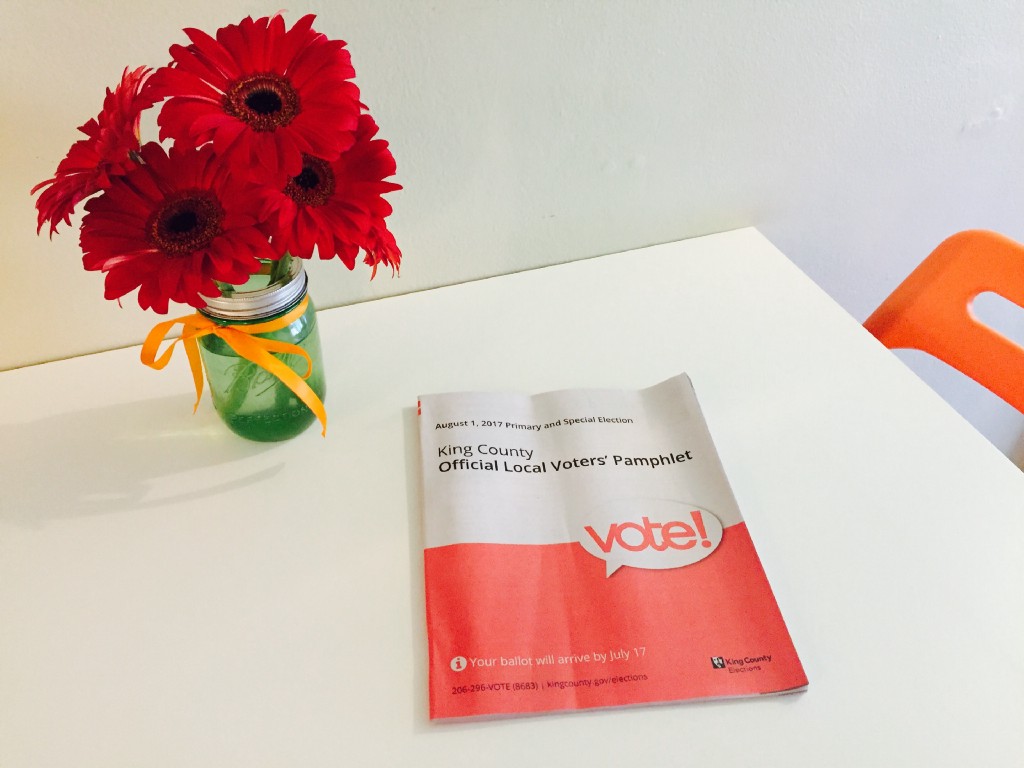On Taxes and Voting
Because we’re all supposed to start locally, right?

So in that episode of The Other Washington that I referenced earlier this week—the one about homelessness in Seattle—the podcast explained that the best way to help people wasn’t actually to donate money to homeless shelters. (Even though that is helpful, and I did.)
The best way to help is to vote for elected officials who can enact public policies, redistribute budgets, and raise taxes.
I don’t know about you, but I am not feeling too enthusiastic about the voting process right now. When I clicked over to The Stranger to read their guide to the candidates and issues on Seattle’s August primary election ballot, they immediately acknowledged that a lot of people aren’t feeling too enthusiastic about the voting process right now. Since they’re The Stranger, they also called those people “assholes.”
Then they acknowledged the many ways you have to compromise your own values while voting:
We’re sick of funding things designed to help low-income people with regressive taxes that disproportionately impact low-income people. Yes, this .1 percent sales tax increase amounts to just a penny on every $10 spent, but it’s still a shitty regressive tax. We’re voting for it anyway. If that makes us hypocrites, so be it. But anyone who’s against endorsing this thing because it’s regressive and isn’t out there pushing for a fairer, more progressive tax system is a far worse hypocrite.
And I should probably be feeling a little better about the whole voting/government/rules/procedures thing, given that the Washington Post is running headlines like “Senate Now Lacks Votes to Abolish Parts of ACA Outright.” (We did it! Our phone calls!)
Except when I click on that headline, it changes:
Trump suggests Republicans will let ACA market collapse, then rewrite health law
Speaking to reporters in the Roosevelt Room on Tuesday afternoon, Trump said he was “disappointed” in the demise of the Senate bill and viewed the cratering of the nation’s individual insurance market as the best way to advance his goals.
Now his plan is to “let Obamacare fail; it will be a lot easier,” he said. “And I think we’re probably in that position where we’ll just let Obamacare fail.”
Back to local elections. The Stranger has gone ahead and endorsed a single candidate for every council and commissioner position, but this time Seattlish—my other “figure out how to vote” source—has found it easier to identify the worst candidates and harder to choose between the better ones.
The Seattlish Guide to Your Ballot, August Primary 2017 Edition
Which should be good, right? More qualified candidates to choose from means I can think carefully about the issues I value instead of voting based on “NOT THAT PERSON.”
So I have some thinking to do before August. I mean, I’m pretty sure I’ll vote for the regressive tax that also funds educational and artistic opportunities for low-income children, though I want to read the source material first.
Part of me is, like, “what if we all just gave enough money that we could fund these opportunities without a tax,” which would also ensure that we got the public policies we wanted without having to vote on them, and I’m sure The Stranger would call me an asshole for even thinking of subverting the voting process by throwing cash at what I want.
Luckily for me, The Other Washington already did the math on that. It doesn’t work, even with million-dollar donations. Taxes really are the better way of funding public services, especially long-term.
I’m not sure I really thought seriously about taxes, in the “okay, what are the long-term effects of higher vs. lower taxes, and how might that affect people besides me” sense, until the past year or so.
- When There Isn’t Enough Tax Revenue to Cover Basic Public Services
- When There Isn’t Enough Tax Revenue to Cover the Government’s Financial Needs
You just… pay taxes, and you talk to your CPA about how you can deduct stuff from your taxes, and you vote for the thing that looks like it’s going to support public transportation or schools or whatever you support and trust that the tax side of it will work itself out, right?
Or you vote for the elected officials who then vote to start trying to implement a city-wide income tax on people earning over $250,000 (individual) or ($500,000) joint, in order to reduce the amounts Seattle needs to collect in regressive taxes.
Seattle income tax passes first hurdle
“This is a step toward a fairer tax system,” said Councilmember Tim Burgess, who chairs the Finance Committee that approved the plan Wednesday morning, in a news release. “We will use the tax proceeds to lower property taxes and to fund essential city services. In a state with the most regressive tax structure in the entire country, Seattle is again leading with progressive reforms.”
That happened earlier this month and I only learned about it accidentally, when I was trying to research who might be negatively affected by the regressive tax that provides artistic opportunities to low-income kids. There’s so much I’m not really paying attention to, even in my own city. Even as I’m about to vote on a bunch of stuff.
Everything I’ve read in the past nine months has come back to this idea of voting, starting with local elections, as the best thing you can do to improve… whatever it is you want to improve. From climate change to health care to social justice to the minimum wage. Phone calls and donations are second-best. The stuff you do before and after you vote.
Which means I have some reading ahead of me, and some ballot-shaped education.
Support The Billfold
The Billfold continues to exist thanks to support from our readers. Help us continue to do our work by making a monthly pledge on Patreon or a one-time-only contribution through PayPal.
Comments